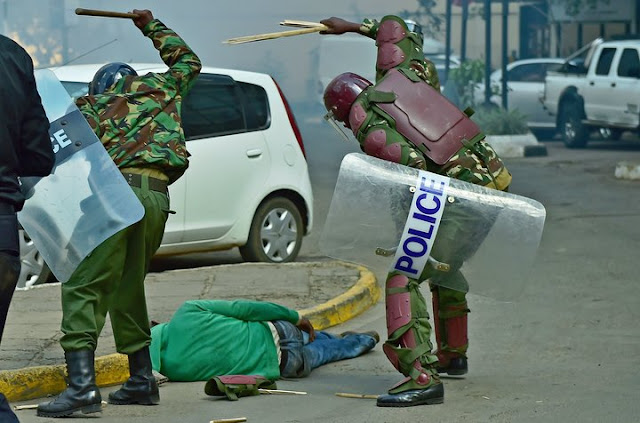 |
| Authoritarian law enforcement |
Charles Dickens’ most memorable opener reads:
‘It was the best of times, it was the worst of times, it was the age of wisdom, it was the age of foolishness, it was the epoch of belief, it was the epoch of incredulity, it was the season of Light, it was the season of Darkness….’
Such is the time, the age, the epoch and the season for SUDAN; it is the era of the Internet of Things, it is the era of the Things of the Internet.
After Sudan’s former president Omar Bashir was yanked out of power and correspondingly imprisoned, the Sudanese seem to have found their voice – a voice that was muzzled by decades of authoritarian rule under Bashir.
Yet in the middle of all the new-found courage, the military’s temporal hold on to power has visited murder, rape and maim on the citizens who clamour for a civilian rule.
 |
| Viral photo of a woman leading protesters at a rally in Sudan. Courtesy: The Observer |
The revolution in Sudan is one we must all BE. When we become, we overcome.
The world let the Rwandese down in 1994, Belgium merely had a hand in it. The Jews massacred by Hitler Nazis. The Iraqis, the Somali-shifta, South African apartheid and xenophobic times are all but few examples.
In this era of the internet of things and things of the internet, we must not allow tyrants and despots to rule anymore. The online battle lines have to be drawn. Any tweet or post that reeks despotism and authoritarianism must face uncontrolled opposition.
 |
| Sudanese protesters at a rally. Courtesy: Al Jazeera |
Today, Sudan faces internet shutdown as a result of their expression of displeasure with the status quo.
Uganda, went through a similar treat back when 75 year-old Museveni sort for his somethingth presidential term. He then imposed a social media levy on WhatsApp, Facebook and Twitter.
In Tanzania, the government is notorious for digital clampdowns. Maxence Melo of Jamii Forums has borne the brunt of repressive control. Traditional media is not spared either, point in case destruction of Clouds Media equipment during the Magufuli administration.
Egyptians were also treated like dirt when the government in 2011 shut down the internet. Egyptians having realized the revolutionary potential of the internet from the Arab Spring, Hosni Mubarak was dethroned shortly after.
 |
The Kenyan cybercrimes law is perhaps the most sinister of all Eastern and Central African laws. By deceptively maintaining that the law is about dealing with online offences like insult, yet we know verily that it has led to state censorship.
The point here is that the internet is an integral part of democracy.
The internet is a revolutionary tool. The cases I have cited serve to show that despots have a tendency to disrupt and stifle progressive debates hence the clampdown and internet shutdowns.
Internet freedoms are just as important as the freedoms guaranteed in chapter 4 under the Bill of Rights.
When we allow despots to disrupt social media and other things of the internet, we pose a threat to our nascent digital economy, democracy and other civil liberties.





7 Comments
.
ReplyDeleteIts a great mind opening article
ReplyDeleteThank you Ali
DeleteGreat work sammy.
ReplyDeleteThe accompanying images are on point
Thank you Dan
DeleteInteresting read. This has me thinking that democracy is in fact just a front, imagine it, the illusion of freedom. If China took over the world, Sam, clamp downs on how we use the Internet would be normal. The reason we love the ruling power of the day is just because they give us the illusion that we are free to say what we feel. But if you really look at it, leaders here in Kenya and others have shown us time and time again, they can do what they feel like. Just wait until the shadow governments of the world direct their draconian approaches and you will see how most govts are fronts.Only divine intervention can save us little people.
ReplyDeleteMimi
ReplyDelete